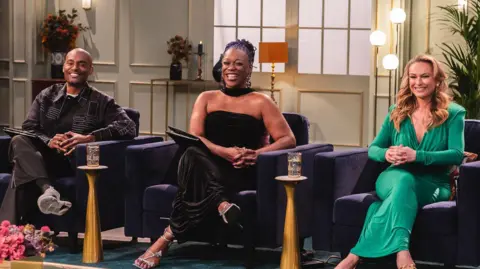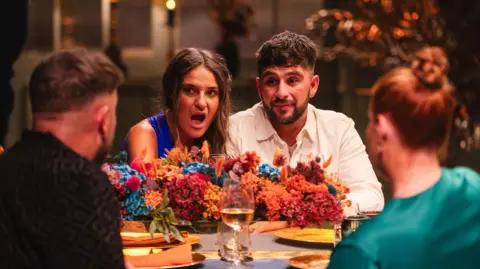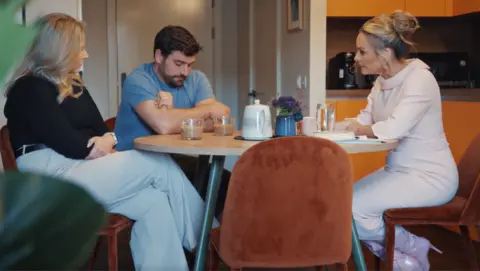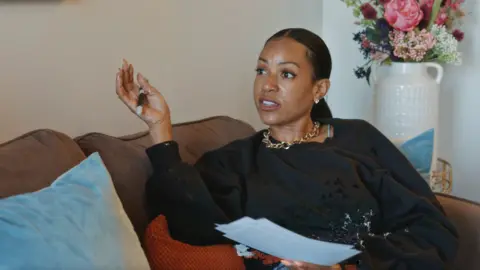
 Channel 4
Channel 4
The eight couples have wedded, their week-long honeymoons are over and now they are adjusting to married life, living on top of each other in small London apartments.
But can they really be coached into loving each other?
Channel 4’s Married at First Sight is a bold social experiment, where single people marry total strangers, meeting for the first time at the altar.
In this series, several couples are off to a rocky start – issues of attraction, clashing personalities and avoidant behaviour has been plaguing some participants.
To help them navigate the trials and tribulations of marriage the show has three matchmaking experts – Paul Brunson, Mel Schilling and Charlene Douglas.
With most couples relying heavily on the advice from them, to what extent is what we see on TV similar to the therapy that happens in a real counselling room?
‘Drama gets views’
Psychotherapeutic Counsellor Emma Loker explains that the format of the show is “somewhat like group therapy” as couples discuss their relationships with the experts in front of everyone at the commitment ceremonies.
The ceremonies are filmed across a full day, meaning the couples get more time with the experts than is seen in the condensed one hour of television.
During the ceremony, it’s not uncommon for the other participants to gasp, tut, cry and pull all sorts of faces, which Loker says is a key difference, as in a counselling room “people will be told to be respectful of one another”.

 Channel 4
Channel 4
The couples live in the same complex, meaning they often confide in each other about their relationships.
I’m the first to speed dial my friends to moan about my partner, but where my friends keep my relationship drama a secret, most MAFS participants are eager to share their titbit of gossip with others.
Dr Sham Singh, a US based psychiatrist says “external support may be well-meant, but too many voices can be confusing”.
“Therapy is a place where both partners get to be heard without some outside bias”, he explains, adding that he helps couple “strengthen their direct communication so that they become confident enough to tackle an issue first before involving others”.
The matchmakers have advised couples to focus on direct communication, but this can sometimes be challenging, due to the format of the show.
It includes prompt questions for the couples to address, at the weekly dinner parties, which can fuel the drama.
In response, a spokesperson for MAFS tells the BBC the show “is unscripted and observational, and reflects the wide variety of sometimes complex and challenging relationship dynamics that exist in the real world”.
Do counsellors tell clients off?
The matchmakers have been known to give participants a telling-off for certain behaviours or comments that they deem unacceptable.
Life coach Paul told Eve she wasn’t “giving this experiment any bit of fairness”, while his fellow expert Mel called her out for “lying” at the commitment ceremony.
But counsellor Jonathan Eddie says he would “absolutely never” tell a client off.
Susie Masterson, a trauma therapist, explains that the experts may be expressing disappointment “as a way to reflect how friends or family might react in a real-world setting, which can help couples understand how their behaviour impacts others”.

 Channel 4
Channel 4
Lou Campbell, a relationship counsellor, explains that the telling-off “is entirely made for TV” as qualified therapists “challenge behaviours” but don’t scold their clients.
She thinks the matchmakers using this technique is concerning because “many participants seem quite vulnerable and could benefit from real individual therapy”.
Counsellor Loker has reservations about the experts giving guidance as they could “unintentionally give harmful advice or miss critical emotional red flags that could exacerbate issues in the relationship”.
A MAFS spokesperson said the “onscreen experts bring a wealth of experience, and are qualified specialists in a range of disciplines, from psychodynamic and psychosexual therapy, to couples counselling, life coaching and matchmaking.
“They offer the couples informed and educated advice and guidance throughout the process.”
The spokesperson added that additional offscreen psychological support is also available to the contributors.
One of the issues troubling some couples this year is physical attraction, and the experts have have reprimanded Adam and Casper for their “unkind” words and “nonsense” excuses as they have both said they are not attracted to “curvy girls”.
“Those sound like personal judgements and it’s an ethical principal that we are not judgemental,” explains counsellor Eddie.

 Channel 4
Channel 4
When it comes to physical attraction, therapist Dr Olivia Lee recommends “small acts of kindness, open dialogue, and intentional time together”.
This advice is very similar to what the experts told the two men struggling to find their wives attractive because they aren’t petite or brunette.
Dr Lee says there are definitely some similarities between advice from the experts and qualified therapists “especially when it comes to fostering open communication, addressing conflict, and exploring emotional needs”.
Mel’s intervention with Caspar definitely seems to have helped the couple, but Dr Lee cautions that the advice the experts dish out is often too short-term for it to have a lasting impact.
Ultimatums
One of the most stark differences between the show’s experts and qualified counsellors is that the former often want their matchmaking to succeed so encourage participants to stay on the show.
“I have no vested interest in the outcome of my clients’ relationships, my focus is on supporting them in whatever direction feels most authentic for them,” Masterson says.
Similarly, the experts told Richelle she had to commit to the process fully which is understandable for the TV experiment,
Masterson explains that ultimatums are not usually used by qualified counsellors as it’s not her job “to force couples to stay together”.
She adds that Richelle’s “signs of avoidant attachment could be an underlying therapeutic challenge” which the experts may not qualified to help her with.

 Channel 4
Channel 4
While it’s clear that the experts are well intentioned in their advice and it can be somewhat helpful, Dr Lee says it’s important to remember that the primary focus of the show is to entertain and what the experts say “shouldn’t be considered sound therapeutic advice”.
Advice from a qualified counsellor is more likely to help a flailing marriage than the opinions of matchmakers, but in the context of a reality TV show, the experts strike a pretty good balance between being helpful and entertaining.








